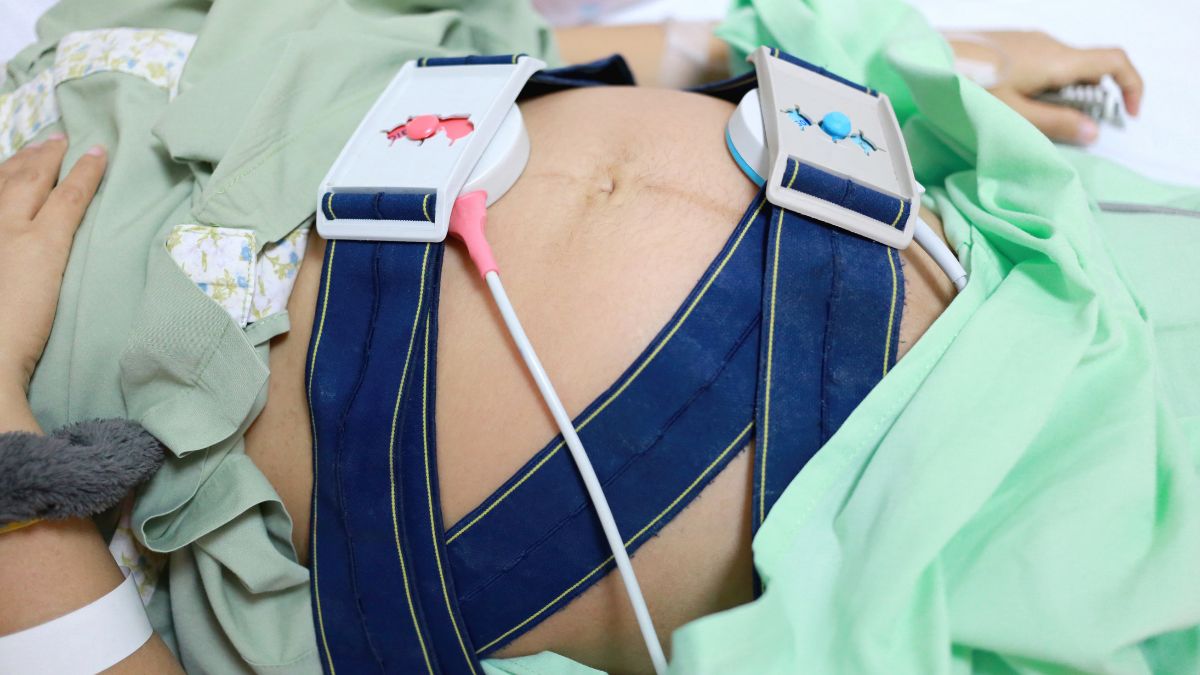Pregnancy loss, often called miscarriage, is a heartbreaking event that affects many pregnancies.
Despite the high prevalence, the topic is shrouded in misconceptions and misinformation.
This comprehensive guide aims to shed light on the intricate nuances of pregnancy loss, including its frequency, high-risk periods, contributing factors, and the importance of prenatal care!
Understanding the Concept of Pregnancy Loss
Pregnancy loss, colloquially known as a miscarriage, refers to the spontaneous termination of a pregnancy before the 20th week of gestation.
In medical terms, it’s defined as the loss of a fetus that occurs before 20 weeks of gestation.
On the other hand, a stillbirth is a pregnancy loss that happens any time after 20 weeks.
It’s crucial to note that pregnancy loss is not the fault of anyone. Unfortunately, it is often perceived as an omen of recurrent miscarriages, which is a misconception.
The chance of experiencing recurrent miscarriages (at least 2 or 3) is relatively low, occurring in about 1-5% of women.
The Frequency of Pregnancy Loss: An Overview
The frequency of pregnancy loss can vary greatly. Statistics indicate that about 10 to 20 percent of known pregnancies end in a miscarriage.
However, it’s speculated that the actual number could be significantly higher as many miscarriages occur very early in the pregnancy — sometimes even before the individual concerned is aware of their pregnancy.
Fetal Development and Miscarriage
The fetal development process is complex and delicate, with each week of gestation signifying critical development milestones.
During the initial weeks post-fertilization, the cells divide and form the genetic material that constitutes a person.
A healthy human being should have a total of 46 chromosomes — 23 from each parent.
If any complication occurs during this cell division, a chromosome might either be missing or repeated, which can lead to pregnancy loss.
The High-Risk Period for Pregnancy Loss
The risk of experiencing a pregnancy loss varies as the pregnancy progresses. For instance, around 80% of pregnancy losses occur between 0 and 13 weeks during the first trimester.
The risk of miscarriage drops significantly as the pregnancy progresses beyond the early stages.
The fetus becomes less vulnerable to harm, and the would-be parents might adopt healthier lifestyles upon discovering the pregnancy, further reducing the risk.
Breaking Down Miscarriage Frequency by Week
Understanding miscarriage rates by week can provide a clearer picture of when pregnancy loss is most likely.
Here is a general estimate of miscarriage risk by week:
Weeks 3-4
Around 50-75% of pregnancies end before a positive result is obtained on a pregnancy test.
Many individuals might not even realize they are pregnant due to the early nature of these pregnancy losses.
Week 5
The rate of miscarriage during the 5th week varies significantly.
Research indicates an overall chance of losing a pregnancy after week 5 is approximately 21.3%.
Weeks 6-7
The rate of loss drops to about 5% after the 6th week.
In most cases, a healthy heartbeat can be detected on an ultrasound around this time, indicating a lower chance of miscarriage.
Weeks 8-13
In the latter half of the first trimester, the rate of miscarriage ranges between 2-4%.
Weeks 14-20
Between weeks 14 and 20, the chance of experiencing a miscarriage falls to less than 1%.
Beyond week 20, a pregnancy loss is referred to as a stillbirth.
The Role of Age in Pregnancy Loss
Age plays a significant role in determining the risk of pregnancy loss. The quality of the eggs tends to decline with age, increasing the chance of miscarriage.
Here is an average breakdown of miscarriage chances by age:
- Under 35 years old: Approximately a 15% chance of pregnancy loss.
- Between 35 and 45 years old: A 20-35% chance of pregnancy loss.
- Over 45 years old: Roughly a 50% chance of pregnancy loss.
Miscarriage Risk Factors
Several factors can increase the risk of pregnancy loss. Some of these include:
- Advanced maternal age
- Smoking or drug use
- Uncontrolled chronic conditions, such as diabetes or high blood pressure
- Hormonal disorders
- Genetic abnormalities
Does Bleeding Mean Miscarriage? (Recognize the Signs)
It’s critical to recognize the signs of miscarriage for timely medical intervention. The earliest sign of a miscarriage is often bleeding.
However, not all bleeding indicates pregnancy loss.
Other symptoms to look out for include:
- A sudden reduction in pregnancy symptoms.
- Decreased fetal movements in the second trimester.
- Intense cramps.
- Passing blood clots.
Prenatal Care and Miscarriage Prevention
While it’s often unavoidable, you can still take certain steps to mitigate the risk of miscarriage.
- Early Prenatal Care: Schedule a prenatal appointment as soon as you know you’re pregnant. Regular check-ups and early monitoring can help identify and address potential issues.
- Implement Healthy Lifestyle Choices: Adopt a balanced diet of essential nutrients, including folic acid. Avoid smoking, alcohol, and illicit drugs, as they increase miscarriage risks.
- Manage Chronic Health Conditions: If you have existing health conditions like diabetes or high blood pressure, work closely with your healthcare provider to manage them effectively during pregnancy.
- Stay Hydrated: Drink plenty of water to maintain adequate amniotic fluid levels and support overall health.
- Exercise Moderately: Engage in regular, moderate physical activity with your doctor’s approval. Exercise can help reduce stress and improve blood flow to the placenta.
- Manage Stress: Practice stress-reduction techniques such as meditation, deep breathing, yoga, or engaging in activities you enjoy.
- Avoid Environmental Hazards: Minimize exposure to harmful chemicals, toxins, and radiation whenever possible.
- Be Cautious with Medications: Always consult your healthcare provider before taking any medication during pregnancy.
- Monitor Weight Gain: Aim for a healthy weight gain during pregnancy, as excessive or insufficient weight gain may increase the risk of complications.
- Use Your Support System: Surround yourself with a supportive network of family and friends to help you through your pregnancy journey.
If you have a chronic condition, keeping it under control is essential to reduce the risk of pregnancy loss.
Frequently Asked Questions (FAQs)
What are the odds of miscarriage after 8 weeks?
The odds of miscarriage after eight weeks of pregnancy are significantly lower compared to the early stages of pregnancy. Generally, after reaching the 8-week milestone, the risk of miscarriage drops to around 1% to 5%.
Why is week 10 of pregnancy the worst?
Week 10 of pregnancy is often considered challenging for some women due to the possibility of experiencing heightened pregnancy symptoms. During this time, hormonal fluctuations can increase nausea, fatigue, and breast tenderness. Additionally, some women may still be coping with first-trimester uncertainties and anxiety related to the early stages of pregnancy.
Which sleeping position can cause miscarriage?
Sleeping on the back and right side presents a higher risk of stillbirth, reduced fetal growth, low birth weight, and preeclampsia, a serious high-blood pressure disorder that affects pregnant women. Sleeping on the left side is often recommended because it can improve blood flow to the uterus, placenta, and fetus, as well as enhance kidney function and reduce pressure on major blood vessels.
Can caffeine cause miscarriages?
One caffeinated beverage a day does not increase the chance of a miscarriage. However, according to WebMD, two or more caffeinated beverages per day can increase the chance of miscarriage.
Can too much bed rest cause miscarriage?
While bed rest was once commonly prescribed as a precautionary measure for women with a history of miscarriages or pregnancy complications, current medical guidelines do not routinely recommend extended bed rest during pregnancy. In fact, some studies have shown that excessive bed rest may be associated with an increased risk of certain pregnancy complications.
Wrapping it Up
Pregnancy loss is a complex and emotionally challenging event. While the risk is real, it’s important to remember that most pregnancies result in a healthy birth.
A previous history of miscarriage or risk factors for it does not guarantee a repeat occurrence.
Understanding the various elements related to pregnancy loss — from the high-risk period to the factors that can contribute to it — can help manage the process effectively.
With quality medical care, support from loved ones, and adequate time for healing, most people can move forward and have a healthy pregnancy following a miscarriage.
The information provided in this article is for informational purposes only and is not intended to be a substitute for professional medical advice, diagnosis, or treatment. Always seek the advice of your physician or other qualified healthcare provider with any questions you may have regarding a medical condition. Do not disregard or delay seeking professional medical advice because of something you read in this article.
You Might Also Like…
What is Lightning Crotch & Can it Break Your Water
Can I Wear a Postpartum Belt While Sleeping?
Sources
- WebMD (2012, June 14). Does Drinking Caffeine Increase Your Risk of Miscarriage? Retrieved July 23, 2023, from https://www.webmd.com/baby/features/does-caffeine-raise-risk-of-miscarriage
- University of Utah Healthcare (n.d.). RECURRENT PREGNANCY LOSS. Retrieved July 23, 2023, from https://healthcare.utah.edu/fertility/conditions/miscarriage-recurrent-pregnancy-loss
- Mayo Clinic (2021, October 16). Miscarriage. Retrieved July 23, 2023, from https://www.mayoclinic.org/diseases-conditions/pregnancy-loss-miscarriage/symptoms-causes/syc-20354298
- American Pregnancy Association (n.d.). Symptoms & Signs of Miscarriage. Retrieved July 23, 2023, from https://americanpregnancy.org/getting-pregnant/pregnancy-loss/signs-of-miscarriage/
- Medical News Today (2023, April 17). What are the average miscarriage rates by week? Retrieved July 23, 2023, from https://www.medicalnewstoday.com/articles/322634








